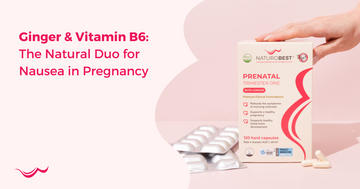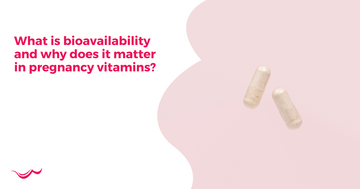Benefits of Magnesium During Pregnancy
by NaturoBest Naturopath Team on Jul 02, 2024

Pregnancy is an incredible journey, but it can come with its fair share of challenges. From muscle cramps to nutritional deficiencies, expectant mothers often face several obstacles that can make this time less enjoyable and more stressful. One nutrient that can play a vital role during pregnancy is magnesium. In this blog post, we'll explore the importance of magnesium, answer some common questions, and provide actionable advice to help you navigate these challenges.
Is Magnesium Safe During Pregnancy?
During pregnancy, your body requires extra nutrients to support both your health and the development of your baby. Magnesium is a crucial mineral that contributes to various bodily functions. It helps regulate muscle and nerve function, blood sugar levels, and blood pressure. Additionally, magnesium supports the structural development of bones and the synthesis of protein and DNA. The recommended dietary intake (RDI) for magnesium during pregnancy is 350mg per day.
However, many pregnant women don't get enough magnesium from their diets alone. This shortfall can lead to several issues, including muscle cramps and overall discomfort. Ensuring adequate magnesium intake can help mitigate these problems and support a healthier pregnancy journey.
Which Magnesium Supplement is Best for Pregnancy?
When it comes to choosing a magnesium supplement during pregnancy, it's essential to consider the form of magnesium that will be most beneficial. Different types of magnesium supplements offer varying levels of absorption and effectiveness.
Magnesium Citrate - known for its high bioavailability, magnesium citrate is easily absorbed by the body and can help with constipation, a common issue during pregnancy.
Magnesium Glycinate - this form is also highly absorbable and less likely to cause digestive discomfort.
Magnesium Oxide - magnesium oxide has much lower bioavailability than other forms and is often used as a laxative. It might be suitable for those looking for a cheap option but is not the best choice for improving magnesium levels efficiently.
It's always best to consult with your healthcare provider before starting any new supplement to ensure it fits your specific needs and circumstances.
How Much Magnesium Per Day for Pregnancy?
Meeting your daily magnesium needs during pregnancy is crucial for both you and your baby. The RDI for pregnant women is approximately 350mg per day. This amount can typically be achieved through a combination of a balanced diet and supplementation.
Food Sources of Magnesium
Incorporating magnesium-rich foods into your diet can help you meet your daily requirements. Here are some excellent sources of magnesium:
Leafy Greens: Spinach, kale, and swiss chard are all high in magnesium.
Nuts and Seeds: Almonds, cashews, pumpkin seeds, and sunflower seeds are great options.
Whole Grains: Brown rice, quinoa, and whole wheat bread can contribute to your magnesium intake.
Legumes: Black beans, lentils, and chickpeas are nutritious and magnesium-rich.
Fish: Salmon and mackerel are not only good for omega-3 fatty acids but also provide a healthy dose of magnesium.
By incorporating these foods into your meals, you can boost your magnesium intake naturally.
Does Magnesium Help with Nausea During Pregnancy?
Morning sickness and nausea are common complaints during pregnancy, especially in the first trimester. While magnesium is primarily known for its role in muscle and nerve function, some evidence suggests it may help alleviate nausea.
Magnesium's calming effect on the nervous system can potentially reduce the frequency and severity of nausea. Additionally, maintaining adequate magnesium levels supports overall well-being, which can contribute to lessened nausea symptoms.
If you're struggling with nausea, try incorporating magnesium-rich foods into your diet and consider a magnesium supplement if recommended by your healthcare provider.
Outcomes: The Benefits of Adequate Magnesium Intake
Ensuring you get enough magnesium during pregnancy can lead to several positive outcomes. You might experience fewer muscle cramps, improved overall comfort, and a more relaxed nervous system. Adequate magnesium levels also support the healthy development of your baby's bones and teeth, contributing to a strong start in life.
As you incorporate magnesium into your routine, you'll likely feel more confident and empowered, knowing you're taking proactive steps to support a healthy pregnancy. This shift from discomfort and anxiety to comfort and peace of mind can make a significant difference in your overall pregnancy experience.
Your Next Steps
Because ensuring a healthy and comfortable pregnancy is your goal, isn't it? What aspects of maintaining your magnesium levels do you think would be most beneficial for you and your baby?
**P.S.** If you found this information helpful and want to learn more about how to support your health during pregnancy, consider exploring our range of nutritional supplements designed to meet your specific needs. Your journey to a healthier pregnancy starts with the right choices today.




